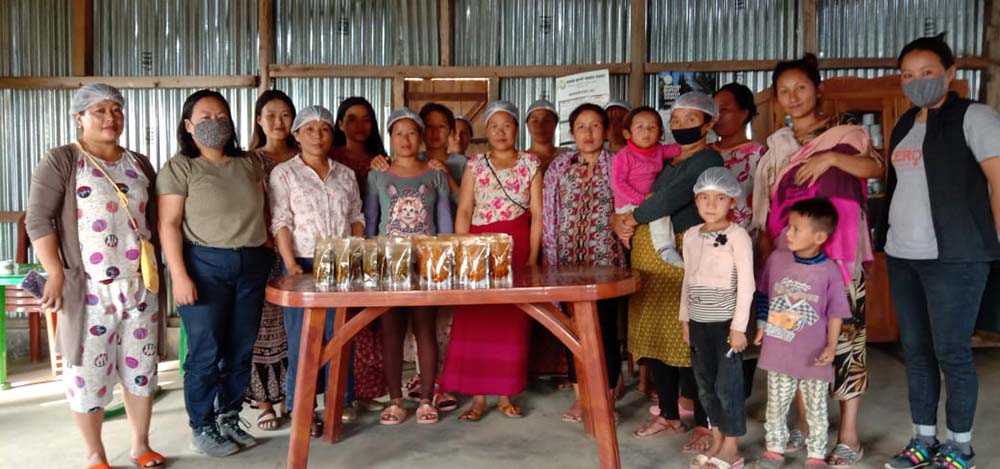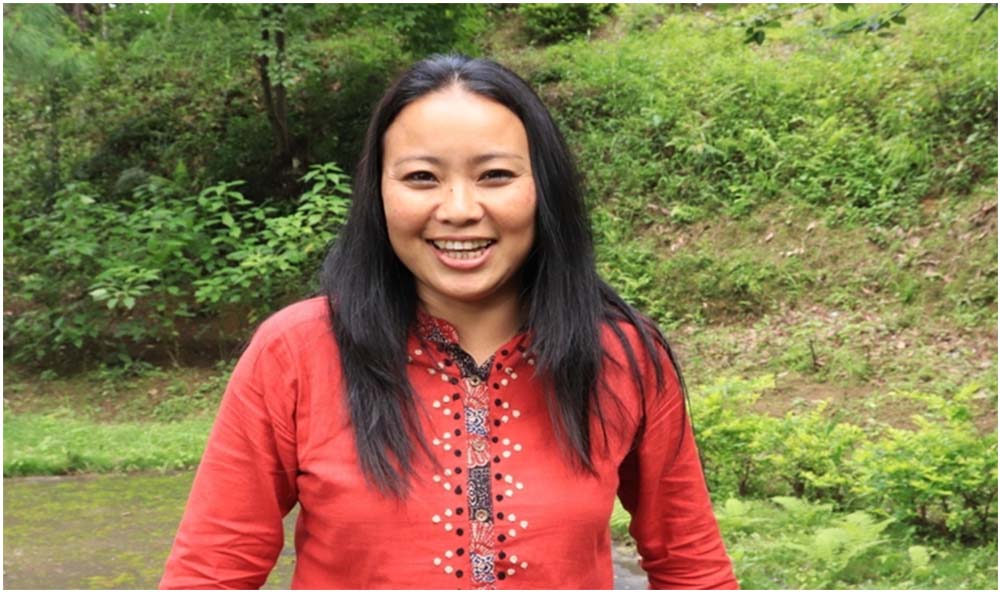Excerpted with permission from The First Responders, by the Reliance Foundation and the Observer Research Foundation, this article shares the story of Nuzovolu. The 37-year-old from Chozuba, Phek district, Nagaland, is a SEWA member working for the welfare of the most vulnerable in her community. This excerpt focuses on Nuzovolu’s work, especially during the COVID-19 pandemic.
Perched on a green hillside at an altitude of 1500 metres, the village of Chozuba in Nagaland's Phek district looks up at an open sky. Small houses rise in tiers above the village's winding roads, and fanning out around the slopes are the graduated terraces where rice is cultivated.
It was here in Chozuba that 37-year-old Nuzovolu, fondly known as Avolu, was born. She studied up to class ten at a local school, and was married a few years later at the age of 22. An abiding interest in school-level education prompted Avolu to take up a position as a primary teacher at a private school. In order to supplement her income she also began to run a hostel for older students.
In 2013, Avolu and her husband Khrukutho moved to Kohima in search of a better life. The migration from a village to Nagaland's capital and its second largest city seemed daunting to the couple at first. Kohima, with its crowded lanes, noisy streets, thriving markets, and acute water shortages during the summer months, seemed far removed from quiet and sleepy Chozuba. Gradually however, Avolu and Khruthko settled into their new home.

Khrukutho was appointed by All India Radio-Kohima as a news reader on a contractual basis, while Avolu worked as a salesperson at a medical store. Her husband also drives a taxi in his spare time to earn an extra income. In Kohima, the couple live in a mixed-tribe community where most men work as construction labourers and women do homebased work. It is here that Avolu came into contact with the Self Employed Women's Association (SEWA), which was, along with the North East Network (NEN), advocating with the local authorities to recognise self-employed women as workers. She was motivated to work with SEWA to help support women in the community with livelihood opportunities and training.
In 2018, Avolu joined the SEWA leadership-building programme and received training on food processing, pickle and snacks making, and basket weaving. Avolu's engagement with the programme made her more assertive, confident, and articulate, and she became an active leader in Kohima. In 2018, she was selected as the convenor of SEWA Kohima district and an aagevan (leader). As an aagevan, and one of the most active leaders of NEN and SEWA, she became a master trainer on psychosocial care and menstrual hygiene. Additionally, she was also appointed as the field mobiliser for Kohima district under the Udyami: Building Resilience of Women Micro-entrepreneurs programme funded by US Agency for International Development (USAID). Avolu was a key part of SEWA and NEN awareness and supportive campaigns during the pandemic. This experience made her more aware of the problems faced by the community and their severity.
“I may not have had much money myself, but I still wanted to support my community,” she says. She walked for over an hour during the lockdown to talk to people about their problems, and then approached the Kohima Municipal Commission and local authorities to seek assistance on their behalf.
The pandemic was extremely challenging, especially for daily wagers, she says. The lockdown aggravated the obstacles faced by informal workers since they had no means to earn a living. As the SEWA district convener, Avolu was keen to help people, especially those who could not pay for food and their children's education. Despite the restrictions on movement, she travelled to the governor's secretariat to pick up an application for free rations for 19 wage workers. She also facilitated ration cards for many families and helped them open bank accounts during the lockdown.

Another significant challenge was that vendors could not operate due to Covid-19 restrictions. Avolu approached several government officials seeking ID cards for the vendors to allow them to operate. After much negotiations, the municipality issued 100 vendor IDs, although she had sought 300. As a result, she received threats from the families of vendors who did not get the ID cards. It took some effort but she was finally able to convey to the families that the municipality could not issue IDs to all due to pandemic protocols and would do so by turn. Appeased, the families backed off, and thanked Avolu for her tireless work on their behalf.
Avolu was also keen to help the women in the community by training them to weave basket and make pickles. She then helped them sell these goods to generate income. Motivated by the support she received from NEN, and the practical training on Covid-19 management, she has built a rapport with home-based workers and street vendors in the community, who were the primary benefactors of her efforts. Avolu also acknowledges the support of her husband, who has shared household responsibilities and motivated her to work for the community.
(Written by Shoba Suri. For more on Nuzovolu and the other women heroes from around the country, read: Jayashree B, Sunaina Kumar, Anirban Sarma, Vanita Sharma, and Shoba Suri, Eds., The First Responders: Women Who Led India Through the Pandemic.)